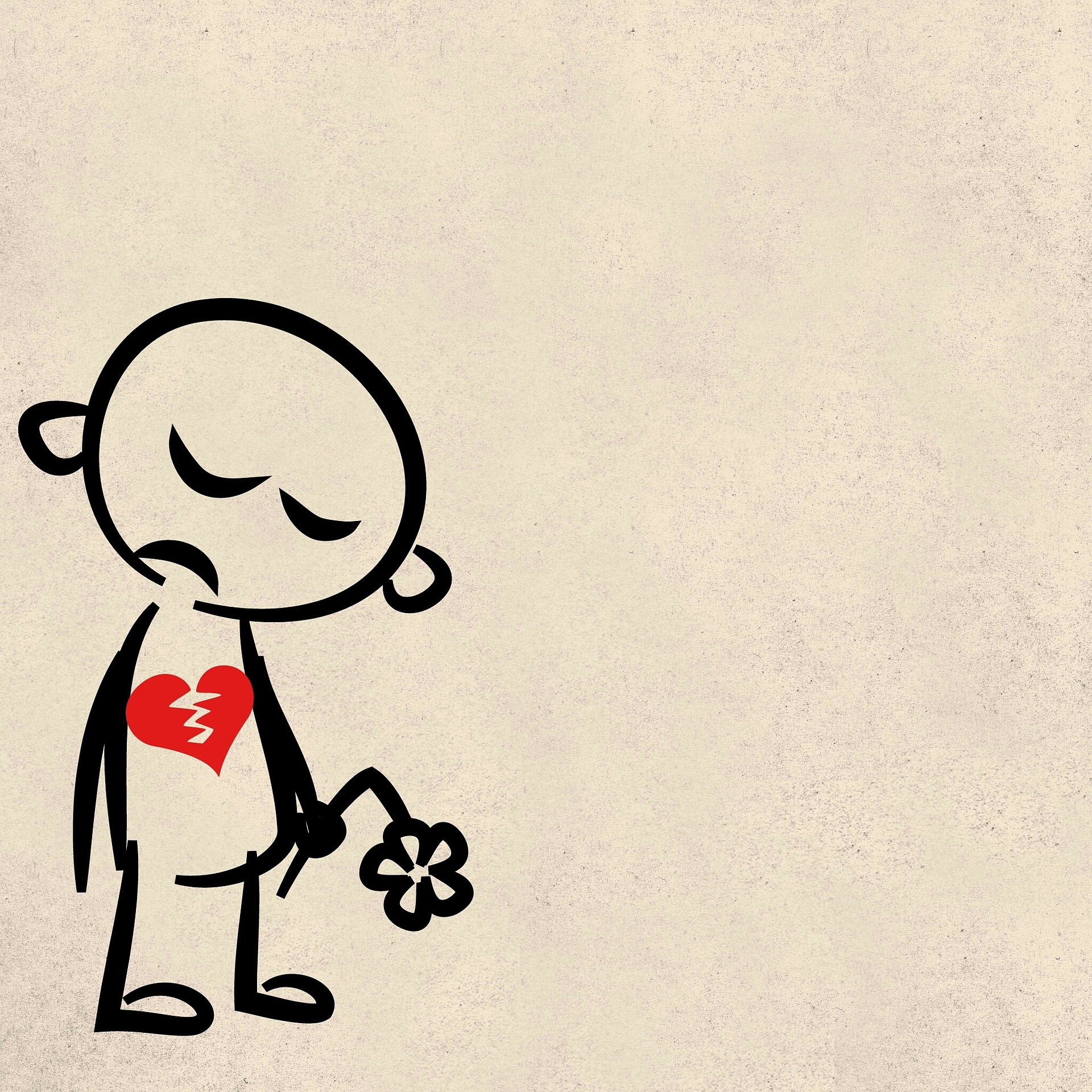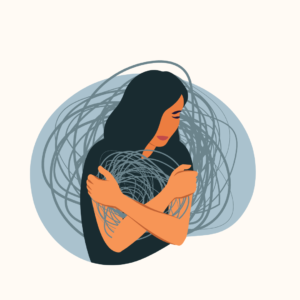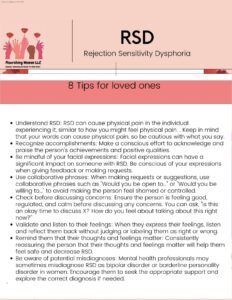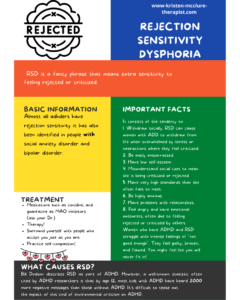
What is the relationship between RSD and ADHD?
RSD and ADHD go hand in hand. RSD is a set of traits that are often associated with ADHD. We don't have a specific, widely recognized estimate for the number of women with ADHD who experience Rejection Sensitive Dysphoria (RSD). While RSD is not an officially recognized diagnosis in major medical or psychological diagnostic manuals, such as the DSM-5 or ICD-11, it is a topic of increasing interest and discussion among clinicians and researchers who work with ADHD populations. SO what is Rejection Sensitive Dysphoria? RSD is characterized by extreme emotional response ( often felt in the body) to perceived or real rejection or criticism.
Adhd people may be more prone to experiencing RSD due to their heightened sensitivity and difficulty regulating emotions.
What are the symptoms of RSD in Individuals with ADHD?

RSD isn't in the DSM yet, but many experts advocate for it to be on the criteria for ADHD. If you have RSD, you feel intensely hurt, shamed, and angry when blamed or rejected. If you have RSD, and as an ADHD woman, you may also experience this severe, intense, painful reaction when you:
Imagine yourself being criticized or rejected
or
Believe that these situations might be occurring ( even if they aren't)
or even
If you fear that they might happen.
Three symptoms of RSD when you have ADHD are Ruminating, Self Blame, and Somatization.
Rumination
One symptom of RSD in ADHD women is rumination, which is the tendency to repeatedly think about and dwell on negative thoughts and emotions associated with an episode as if you are stuck in a loop. This can magnify the experience and make you feel terrible.
Self Blame
If you find yourself blaming and criticizing yourself for something that happened where you feel you were criticized over and over, you might be experiencing RSD.
Body Feelings
Somatization is also a common symptom of RSD in ADHD women. Somatization refers to the physical manifestation of emotional distress, where the individual may experience physical symptoms such as headaches, stomachaches, or muscle tension as a result of the intense emotional reactions associated with RSD. RSD episodes are traumatic.

How common is the co-occurrence of RSD and ADHD?
The only research to date exploring RSD suggests that RSD is higher in women than men (Ginapp et al., 2023).
-
For males, 3 out of 7 reported RSD. This can be expressed as a percentage: 37×100=42.86%73×100=42.86%
-
For females, 30 out of 36 reported RSD. This can be expressed as a percentage: 3036×100=83.33%3630×100=83.33%
Anectodal studies have consistently suggested very high rates of RSD in adhd people.

-
Women with ADHD may avoid social situations due to rejection sensitivity, leading to stress and self-criticism. This withdrawal can further contribute to feelings of depression and anxiety, isolating them from potential sources of support and connection.
-
ADHD women with rejection sensitivity may avoid social interactions out of fear of embarrassment. They may mistakenly interpret others' actions or comments as unfavorable and become angry with others without provocation when embarrassed.
-
ADHD Women with RSD may have low self esteem. Continuous experience of perceived rejection, both in the mind and in reality, can significantly impact a woman's self-worth, leading to low self-esteem.
-
Women with ADHD and rejection sensitivity often misinterpret social cues, perceiving them as criticism or rejection. This can further intensify their fear and anxiety in social situations.
-
Women with ADHD and RSD may be perfectionistic. Some people with RSD may adopt standards for themselves that are impossible to meet to avoid rejection. Others, rather than aiming for perfectionism, may give up.
-
Women with RSD often feel anxious because they fear getting hurt or rejected, along with the thoughts and feelings such rejection might provoke.
-
Women with RSD may have problems with relationships. People with RSD often have trouble in relationships because they often feel fearful that others will hurt them, imagine they will hurt them, or tolerate people who do hurt them!
-
WOmen with RSD and ADHD may feel angry and have emotional outbursts, often due to feeling rejected or criticized by others. Women who have ADHD and RSD struggle with intense feelings of "not good enough." They feel guilty, broken, and flawed.They may feel like they will never fit in! They might then explode or if they perceive they are being attacked.
What makes RSD Worse?
Feeling Abandoned
-
When individuals perceive that the people they love or rely upon are pulling away or distancing themselves, it can trigger feelings of abandonment. This experience is particularly intense for a brain prone to Rejection Sensitive Dysphoria (RSD). The fear of being left alone or the perception that someone important is withdrawing their affection or support can lead to profound emotional pain. Individuals with RSD may interpret minor changes in behavior or communication as indicators of abandonment, causing significant distress and prompting strong emotional reactions.
Feeling Left Out Socially
-
Social exclusion or the sensation of feeling left out can potently trigger RSD. Various settings, such as not receiving invitations to gatherings, being overlooked in conversations, or feeling disconnected from peer groups, can cause this. For those with RSD, these situations can evoke intense feelings of rejection and inadequacy. The emotional response is often disproportionate to the situation because the individual's sensitivity to perceived rejection amplifies the distress and can lead to withdrawal or overcompensation in social interactions.
Underachieving Academically
-
Academic underachievement can be a significant source of distress for individuals with RSD. The inability to meet one's own or others' expectations in an academic setting can feel like a profound personal failure. This experience is not just about the grades themselves but the perceived rejection and judgment from teachers, peers, and oneself. If you are afraid you wont live up to your potential, you might avoid academic challenges, be a perfectionist, or get very emotional if you don't do well academically or as well as you wanted to.
Receiving Critical Feedback at Work
Receiving critical feedback in a professional setting can be particularly challenging for someone with RSD. All feedback can feel like a sign of personal inadequacy. The emotional response can be swift and intense; it very quickly ignites, leading to feelings of shame, anger, or anxiety. Individuals with RSD might find it exceptionally difficult to separate their self-worth from their professional performance, making workplace interactions that involve feedback or evaluation highly stressful and potentially triggering.
What causes RSD?
Further complicating things, Rejection Sensitivity Dysphoria has also been identified in people who have social anxiety disorder and bipolar disorder.
Do Doctors misdiagnose RSD as anxiety or depression in adhd people?
Yes, People misdiagnose RSD as anxiety, depression, or even borderline personality disorder or bipolar disorder in adhd women. The symptoms of RSD, such as intense fear of rejection, sensitivity to criticism, and emotional outbursts, can overlap with mood disorders. RSD is a relatively new construct and isn't widely recognized. A clinician who doesn't specialize in adhd could make this mistake.
ADHD women must be aware of the possibility of misdiagnosis and advocate for themselves when seeking mental health support. So if you suspect that your symptoms may be due to RSD rather than anxiety or depression, it is important to discuss this with a knowledgeable healthcare professional who understands the nuances of ADHD and RSD.
How does Rsd affect academic performance and work productivity in ADHD people?
RSD (Rejection Sensitive Dysphoria) can have a significant impact on academic performance and work productivity in individuals with ADHD.
Fear of rejection can cause you to avoid any task or challenge you might fail at work and school. This can result in underachievement and a sense of personal failure, adding to their emotional distress.
Shame, the feeling that you are bad and unworthy, can lead to spirals of shutting down completely and being unable to focus.
Moreover, the constant fear of rejection and the anticipation of negative feedback or thoughts that you might have failed can create a heightened sense of anxiety and stress, making your day-to-day uncomfortable. This can even lead to chronic stress and even physical illness!
Are there any treatment techniques or approaches that therapists use to address RAD in individuals with ADHD
-
Psychoeducation: Learning about rejection sensitivity and its connection to ADHD can help women understand and validate their experiences. A recent study suggests that just knowing about RSD reduces it (Ginapp et al., 2023).
- Advocacy: Teaching people about rejection sensitivity so they can adapt how they interact with sensitive people
-
Cognitive Behavioral Therapy (CBT): CBT can help individuals identify and challenge negative thought patterns associated with rejection sensitivity. It's important that the therapist who uses this treatment is sensitive and informed about neurodiveristy.
-
Mindfulness and self-compassion practices: Incorporating mindfulness and self-compassion exercises into daily routines can help manage the emotional reactions associated with rejection sensitivity. These practices promote understanding, self-awareness, and self-acceptance.
-
Support groups: Participating in support groups, specifically tailored for women with ADHD and rejection sensitivity, initially offers a safe space to share experiences. Additionally, it provides an opportunity to gain support and, furthermore, to learn from others who face similar challenges.
How can I help my loved one who has ADHD and RSD?
Here are some things you can do in a handy image file!

ADHD and RSD: Medications
Doctors may use medications such as clonidine and MAO inhibitors to help RSD. Doctors may also prescribe guanfacine. Many of my clients report this medication helps. Ask and communicate with your doctor.
Can RSD symptoms in individuals with ADHD vary in severity and intensity over time?
Indeed, the intensity of RSD symptoms in individuals with ADHD can fluctuate over time. Women with ADHD, in particular, may observe that their symptoms vary in response to stress, hormonal changes, and their overall emotional state. Therefore, during periods of increased stress or hormonal shifts, they might experience a worsening of their RSD symptoms. Recognizing and adopting strategies to manage these fluctuations is crucial. In essence, closely monitoring these variations and exploring various coping mechanisms is key to enhancing well-being.
Can You manage and improve RSD over time?
You can manage and support your RSD
When asked why they didn't have RSD, a group of rare adders without RSD cited their support system as a key difference (Ginapp et al., 2023). This is why it's important to create a good support system. Learning to Surround themselves with people who accept them just as they are is a tremendous help. It also might be helpful to know that women with ADHD can sometimes choose partners who aren't supportive and shame them. This may be familiar from their childhood. This is the worst kind of relationship they can pick because it will exacerbate RSD.
Pick people who love and embrace you for who you are. Pick a cheerleader who is in your corner and supports you. Have people in your life who continuously validate that you are lovable exactly how you are. The messages need to be constant.
If you like this information, you can download a fact sheet here at the link below/
References for RSD and ADHD
- ADDitude Editors. (n.d.). Rejection Sensitive Dysphoria and ADHD Symptom Test. ADDitude. Retrieved from https://www.additudemag.com/rejection-sensitive-dysphoria-adhd-symptom-test/
- Rabb, J. K. (2019). The Highly Sensitive Person: What to Do with Rejection Sensitivity Dysphoria. Presented at the 2019 International Conference on ADHD, Philadelphia, PA, November 8th, 2019.
- Dodson, B. (2018). Shame and Fear of Rejection: Regain Control. Presented at Women's Palooza 2018.
- Ginapp, C. M., Greenberg, N. R., MacDonald-Gagnon, G., Angarita, G. A., Bold, K. W., & Potenza, M. N. (2023). "Dysregulated not deficit": A qualitative study on symptomatology of ADHD in young adults. PLoS One, 18(10), Article e0292721. https://doi.org/10.1371/journal.pone.0292721
Medical information obtained from this website is not intended as a substitute for professional care. If you have or suspect you have a problem, you should consult a healthcare provider.
Kristen McClure: Neurodivergent-Affirming ADHD Therapist and Coach with 30 years experience in North Carolina and South Carolina Offering virtual therapy and coaching services across North Carolina, including Ashville, Raleigh, Durham, Wilmington, Greenville, and more. Also serving major South Carolina cities such as Charleston, Columbia, Greenville, Spartanburg, Rock Hill, and more.


